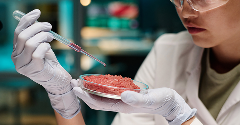News
Japanese study points to risk of excessive nutritional fortification
31 Dec 2024Fortified foods and supplements are mainly beneficial but there is a small risk of over-supplementation – particularly for vitamin B6, a Japanese study has concluded.

The team, which was led by Minami Sugimoto and Keiko Asakura, at the university of Toho’s department of preventative medicine, examined how fortified foods and supplements can contribute to nutrient intakes in Japanese adults.
The study looked at the nutrient intake of 392 adults aged 20 to 69 over the course of four days, with a requirement that individuals used at least one fortified food or dietary supplement per day.
Benefits vs potential concern of vitamin B6 dosing
The results were used to determine intake for individuals who were below the estimated average requirements (EAR), as well as those who exceeded the tolerable upper intake level (UL).
While the study, which is published in the journal BMC Nutrition, recorded significant benefits regarding the nutritional intake of those measured in the study, it did also point to some instances of excessive vitamin B6.
“There was a risk of exceeding the [upper level] when using fortified food and dietary supplements among some users of vitamin B6. These results can be used to design strategies for improving micronutrient intake in Japan and could be the foundation for future research with more nationally representative samples,” the study stated.
While vitamin B6 is crucial, excess can be dangerous
Vitamin B6 is found in a large variety of foods, including spinach, carrots, salmon, beef, potatoes, and bananas. According to the Mayo Clinic, the vitamin is essential for normal brain development, as well as keeping the nervous system and immune system in good health.
However, the Mayo Clinic also points to the fact that excessive intake can cause a lack of muscle control or control of movements, as well as disfiguring skin lesions, heartburn, and nausea.
Commonly, vitamin B6 is added to processed grain and cereal food types, which are labelled as “fortified” or “enriched”. Energy drinks such as Monster and Red Bull are also fortified with it. Multivitamins often contain vitamin B6 in the form of pyridoxine. Health claims may relate to boosting energy and providing nervous system support.
Study also pointed to benefits of supplementation
The study demonstrated that while only 2% of the volunteers exceeded the upper level for vitamin B6, the vast majority of the group benefitted from fortification.
“Users were more likely to meet the estimated average requirements than non-users for six nutrients in the base diets and nine nutrients in the total intake. Among the users, the prevalence of participants below the estimated average requirements decreased by [more than] 10% in the total intake compared with the base diet for five nutrients,” the study noted.
While the study findings noted that the majority of volunteers benefitted from adequate intake of some vitamins and minerals - especially thiamine, riboflavin, vitamin B6, vitamin C, and calcium - the authors stressed their concerns about the risk of exceeding upper levels, specifically with regards to vitamin B6.
Warnings about excessive vitamin B6 intake
In September of this year, the Royal College of Pathologists of Australia put out a warning about excessive vitamin B6 intake, stating that it could lead to adverse symptoms such as peripheral neuropathy.
“Many people may unknowingly consume high doses of vitamin B6 by taking multiple supplements. For example, vitamin B6 (as pyridoxine hydrochloride) is often included in magnesium supplements, with each tablet containing up to 60 mg,” said Dr David Kanowski, a chemical pathologist at Sullivan Nicolaides Pathology in Brisbane. “A patient taking two magnesium tablets per day could be unintentionally consuming 120 mg of vitamin B6, far exceeding the recommended dietary intake for adults in Australia and New Zealand, which is 1.3 to 2.0 mg per day with a maximum of 50 mg per day.”
Looking to the future, the Japanese team of researchers believes its findings could prove pivotal to the design of future fortified food and supplements formulation.
“These results can be used to design strategies for improving micronutrient intake in Japan and could be the foundation for future research with more nationally representative samples,” the study concluded.
Related news

Future F&B flavours favour exploration and explosive taste profiles
25 Mar 2025
Exploration and experimentation will define the future of flavour, according to Mintel, as consumers seek out taste profiles and textures that offer an adventurous eating experience.
Read more
Partnership plans to scale cultivated meat production
21 Mar 2025
Food technology innovator Ever After Foods (EAF) and multinational food leader Bühler are striving to overcome hurdles to access and accelerate the development of cultivated meat.
Read more
Global consumers enjoy food less and perceive it as less healthy
20 Mar 2025
Enjoyment of food and its perceived healthiness is dwindling among most global populations, according to findings from Gallup and Ando Foundation/Nissin Food Products.
Read more
Seafood set to ‘dethrone’ poultry as protein growth king
19 Mar 2025
Seafood is poised to surpass poultry as the leading contributor to global protein supply growth this year, according to Rabobank’s latest protein outlook.
Read more
Tariff volatility leaves food manufacturers in limbo
11 Mar 2025
Rapid US trade policy shifts and tariff escalations are creating uncertainty for food manufacturers and ingredient suppliers.
Read more
F&B industry hit with fresh greenwashing claims
26 Feb 2025
The food and beverage (F&B) industry is under fresh scrutiny amid claims of greenwashing, with Arla the latest company in the firing line.
Read more
Protein diversification: A massive missed market?
20 Feb 2025
Germany and the UK could be missing out on the massive market for alternative meats and proteins, with one new coalition calling for an end to the “steak-tofu struggle”.
Read more
Have scientists discovered a new tool to measure UPFs?
19 Feb 2025
Researchers have developed a new scoring system and database, compiling over 50,000 food items, of which over 1,000 are classified as ultra-processed.
Read more
China ramps up cultivated meat research with new innovation base
18 Feb 2025
China has opened its first fermentation and cultivated meat research centre in Beijing.
Read more
Most consumers lack trust in AI, but supplement users are ready to embrace the technology
14 Feb 2025
A survey of UK and US consumers found that most supplement users are willing to let AI make decisions on their behalf, but they also demand greater transparency.
Read more